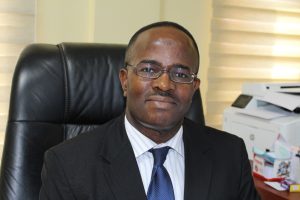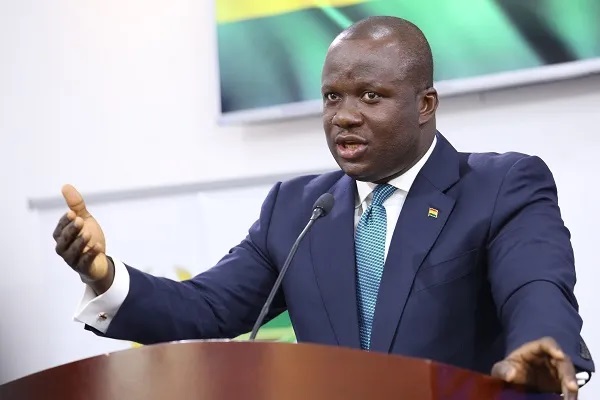
Mining for Development Forum: Minister urges stakeholders to ‘carry communities along’ to curb insecurity
The Minister for Lands and Natural Resources, Hon. Samuel A. Jinapor has charged mining companies in the country to continuously engage communities where they operate in a sustainable manner to safeguard the security of their operations.
According to the Minister, using brute enforcement of the law has not always been efficient in maintaining peace and order on mining concessions.
Anybody who suggests that just by deploying law enforcement agencies and by using brute enforcement will resolve issues of insecurities on large scale mining operations or conglomerate extractive industry anywhere in the world indicates that you have not learnt from history, because it will not work. Enforcement is absolutely important but sustainable measures to carry the community along is also key” noted the Minister.
The Minister, who was speaking at the Mining for Development Forum on the theme “Ensuring the Security of Mining Operations in Ghana: The Role of Stakeholders” organized by the Ghana Chamber of Mines in collaboration with the Ministry of Lands and Natural resources, also charged the mining stakeholders including government to relook at the mining architecture of the country where mining companies are only engaged in mineral exploitation and exportation to value addition where the companies will consider adding value to the minerals right here in the country which will afford the citizens employment opportunity.
The mining or exploitation of raw materials is one that is not sustainable because you are not creating a proper robust value chain linkages which will carry the community with you,” he stated.
He cited South Korea where the major companies in that country including Samsung and Hyundai employ more than half of its own citizens.
What is the state of Tarkwa, Obuasi and other places? He asked.
Hon. Jinapor further added that “Historically, we have built the mining company which is anchored on exploitation and exportation of the minerals which does not generate the value chain in the communities. The communities are standing on one side, and the mining companies on the other side with barricade and security”.
He suggested that, the Ghana Chamber of Mines (GCM) should collaborate with government to come up with short term sustainable interventions to carry the community along.
In his welcome address, the CEO of the GCM, Dr. Sulemanu Koney, noted that when a mine is unsecured, it does not only threaten continuous production but the livelihood of the ecosystem that depends on the mine: communities, government, suppliers, employees, and shareholders.
He added the inability of duty bearers to decisively quell the wanton breach of security at one mine serves as an incentive for other miscreants to perpetrate similar brazen disregard for the rule of law.
This inertia partly fuels the deteriorating security climate at the mines with adverse consequences for all stakeholders. For instance, Asanko Gold Mines spent over USD500,000 to de-risk a portion of its concession through exploration. While the work was ongoing, some persons invaded the area and have since annexed it as their own property. The mine has attempted umpteen times to evict the illegal miners without success,” he lamented.
Dr. Koney noted that these hikes in security breaches impair the quality of mine assets in Ghana and raise the insurance premia, cost of credit, and replacement cost of equipment which invariably culminate in an increase in the cost of production, with the government, community, and investors bearing the brunt of insecurity through foregoing potential revenue.
Certainly, the opportunity cost of inaction is grave and warrants a renewed approach to tackling the menace. When an illegal miner is allowed to stay on a concession, he or she diverts public resources for personal use, which flagrantly violates the constitutional provision that the country’s mineral endowments are publicly owned,” he stressed.

The CEO of the Chamber reiterated that the importance of mining in Ghana’s economy cannot be overstated, it has contributed significantly to the nation’s growth and development, providing significantly to the national kitty, employment, and foreign exchange earnings, community development, and supporting crucial social infrastructure projects.
According to the Ghana Revenue Authority (GRA), the mining and quarrying sector was the largest contributor to direct domestic taxes mobilized in 2022. The total fiscal payments (excluding dividends) attributable to the mining and quarrying sector amounted to GH₵ 6.38 billion, which represents 18.6 per cent of aggregate direct domestic tax receipts in 2022. Further, the Non-Tax Revenue Unit of the Ministry of Finance reported GH₵ 435,099,625 as dividend payments by mining companies in 2022. Overall, the headline fiscal contribution of the mining and quarrying sector in 2022 was GH₵ 6.82 billion.
The minerals sector was also the country’s largest source of forex in 2022. Data from the Bank of Ghana shows that revenue from the export of minerals accounted for 39 per cent of gross merchandise receipts in 2022, which exceeded the disparate outturns of crude oil, cocoa, and other export commodities in the same period. Moreover, the nominal export earnings of the minerals sector outstripped gross receipts from inward remittances in 2022.
The producing member companies of the Chamber continued to play a crucial role in deepening the forex exchange market through the repatriation of a significant part of their mineral export revenue. In 2022, the producing mines returned US$ 1.41 billion through the central bank and US$ 2.73 billion via commercial banks. On the whole, the repatriated gross mineral revenue was US$ 4.14 billion, which translates into 73% of the producing members’ total mineral revenue in 2022.
Further, of the 11,191 number on roll at the end of 2022, only 0.8% are expatriates. This means that for every 1,000 people directly employed at the mine, a whopping 992 are Ghanaians and only eight are expatriates. Additionally, the producing members spent US$ 2.81 billion on goods and services sourced from in-country producers and suppliers, US$ 43.30 million on corporate social investments (CSI) primarily in their host communities and US$ 1.4 billion (representing 26% of mineral revenue) on taxes, dividends, levies, and duties, as well as US$ 678 million on salaries and emoluments of employees engaged by producing member companies. Overall, the producing member companies’ expenditure that accrued to local entities was US$ 4.99 billion in 2022.
You would concur that the mining sector’s activities impact every facet of our economy and must therefore be safeguarded from the activities of criminals, illegal miners, and other miscreants. Recent invasions and attacks on defensive workers have created a sense of debilitating insecurity, stressed Dr. Koney.
Attack on mining companies
It was reported that Perseus was attacked and invaded, Golden Star Wassa’s Benso site was attacked and vandalized, and some equipment and vehicles were set ablaze, Newmont, AngloGold Ashanti Obuasi, Gold Fields, Asanko, Mensin Bibiani Gold, and Future Global Resources (FGR) have all been attacked and sometimes overrun by trespassers. In the case of FGR which happened just last week, 10-gun-wielding persons attacked the mine and attempted to invade the gold room and other sensitive sections of the mine’s plant.
More so, some miscreants set fire to mobile mining equipment and directed it towards the explosive magazines at Mensin Gold Bibiani. Fortuitously, the arsonists were unsuccessful as the blazing equipment deviated from its scheduled course. You can imagine the level of destruction that would have been evinced by such a catastrophic disaster.
Mining for Development Forum
The Mining for Development Dialogue Series is one of the flagship fora of the Ghana Chamber of Mines that brings together stakeholders and industry players to ideate solutions to national issues that affect the viability of the mining industry. As the theme suggests, the event focused on the state of security in the mining sector and its bearing on holistic national development.
This forum represents a remarkable convergence of minds, expertise, and commitment, bringing together a constellation of key players that collectively shape the destiny of our nation’s mining sector. As we address the pressing issue of security within and around our mines, we recognize the indispensable role that each participant here plays in fostering sustainable growth, innovation, and harmony in our mining operations.
Present at the forum were representatives from the Diplomatic Corps, Ghana Police Service, Ghana Immigration Service, Judiciary, National Security, Environmental Protection Agency, Minerals Commission, NGOs, National House of Chiefs, media, and various government bodies.

